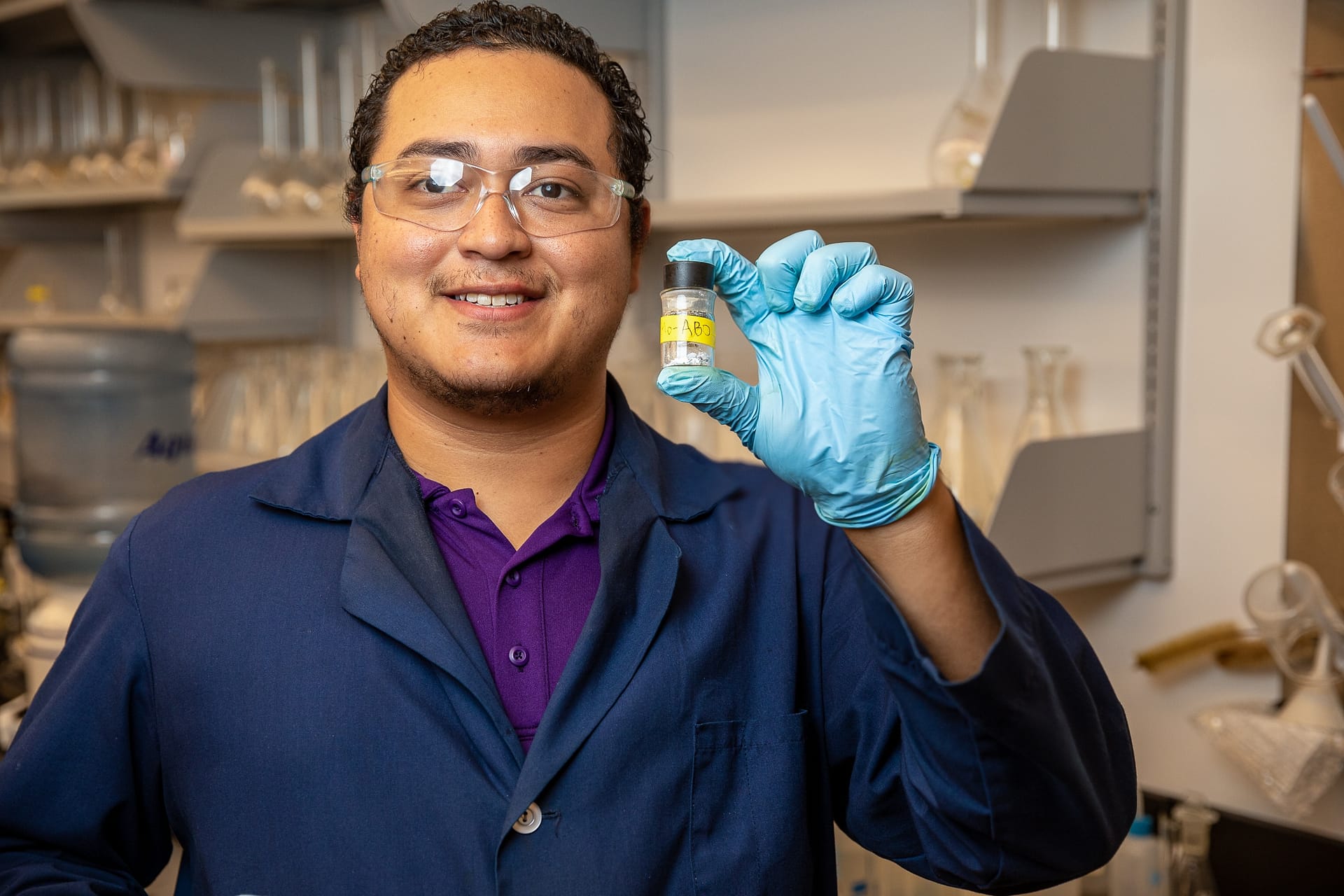Enlarge

Photo by Scott Delony
In May 2019, Diego Zometa Paniagua was preparing to graduate from Abilene Christian University with a degree in chemistry.
Today, just a few months later, he is working in the same building where he took chemistry classes and using the same labs, but with a different goal. He is working on a project with the potential to have a major impact in the world of nuclear medicine. He spends his days looking for chemical ways to extract an isotope, Molybdenum 99, from reactor by-products.
“It has never been done in the United States,” Zometa, a native of El Salvador, said.
Zometa’s being selected as a research scientist in ACU’s NEXT Lab is a testament to his own abilities and the quality of the professors who mentored him. NEXT is an acronym for Nuclear Energy eXperimental Testing Laboratory, a research program at ACU that is experimenting with using molten salts, rather than water, as a coolant for nuclear reactors. Inside the lab, students and faculty conduct experiments that could someday lead to global solutions to the world’s need for less expensive energy, pure and abundant water, and medical isotopes for diagnosing and treating cancer.
According to the National Nuclear Security Administration’s website, the quest to find a reliable and plentiful source of “Moly 99,” as scientists call it, began in earnest in 2009. NNSA partners with commercial and educational institutions to find a source that is produced without highly enriched uranium.
Moly 99 is an isotope used in more than 40,000 medical procedures each day in the U.S., according to the NNSA, but is supplied only by foreign vendors. Every day of the work week, ACU’s Zometa is one of those scientists working toward a lofty goal. If he is successful, the results would be far-reaching.
“It would mean that NEXT Lab would be able to be one of the providers of Moly 99 in the United States and possibly other countries,” Zometa said.
That’s a long way from walking across the stage to graduate with a bachelor’s degree in chemistry, but it speaks volumes about what Dr. Rusty Towell (’90) and his team are building at NEXT Lab. According to the NNSA website, the decay product of Moly 99, Technetium-99m, is used to diagnose heart disease and cancer, to study organ structure and function, and to perform other important medical applications.
The NEXT Lab’s molten salt reactor, now in development, will have an off-gas system that allows gases to bubble out. It is those gases that contain Moly 99, Zometa said. He explained that it takes three days for Moly 99 to decay, creating Technetium 99m, which lasts only six hours.
“That is the one that is used in medicine,” Zometa said. “It is very, very useful.”
Zometa is working on ways to quickly extract Moly 99 from reactor by-products so the decaying process can begin and the needed Technetium 99m can be provided to hospitals. The isotope is shipped to hospitals in the Moly 99 form since it lasts longer. Special equipment called a Technetium 99m generator harvests the Tc-99m as it is being decayed from Moly 99.
If Zometa is successful in his quest, he will then move on to looking for ways to chemically extract other isotopes to benefit the world.
In just four short years, Zometa has gone from asking, “ACU? Abilene? Where is that?” to working on a project with major implications in the university’s NEXT Lab. He’s glad he listened to that small, still voice inside.
“I felt God was telling me go,” he said.
It was 2015 when Zometa first heard that voice. He was a high school senior, working as an intern in the American Embassy in El Savador’s capital, San Salvador. His boss worked with counselors from universities in the U.S.. One of them was Daniel Garcia (’07), who at the time was a multicultural marketing specialist in ACU’s admissions office and is now on faculty of the College of Business Administration. Zometa had applied to several universities and had an array of college admissions information and memorabilia at his disposal. One of those items was an ACU pennant, but he didn’t think anything about it until he connected Garcia with the purple pennant.
“Literally speaking,” Zometa said, “what I was looking for was right in front of me the whole time.”
Zometa enrolled in August 2015 and four years later he is a research scientist. But that’s not all he is. While at ACU, Zometa was named a Pope Fellow, a program offering scholarships for outstanding students interested in public service. In addition to his chemistry degree, he holds a minor in public service.
Today Zometa is thankful he listened to God’s voice and came to ACU. He also is glad he listened to Daniel Garcia.
“Thanks to him, my parents and God,” Zometa said, “I was able to arrive here.”
